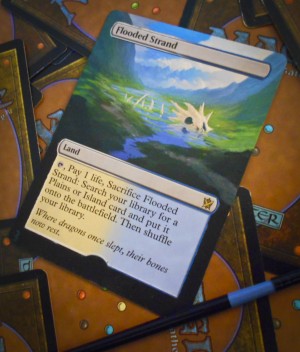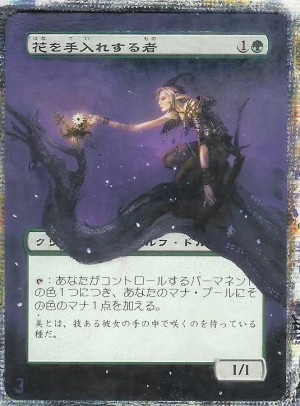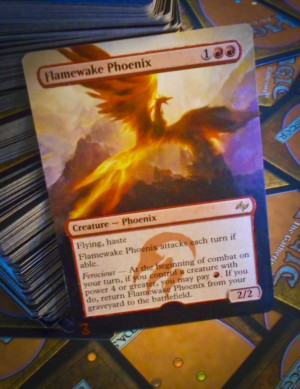Are you a Quiet Speculation member?
If not, now is a perfect time to join up! Our powerful tools, breaking-news analysis, and exclusive Discord channel will make sure you stay up to date and ahead of the curve.
After last week's article about trading altered cards, there were a few points that were raised which I'd like to address before we move on to selling cards.
The first point addressed prices for trade versus prices for sale. For the most part I use the same price. While it is more work to turn cards that I've received in trades into cash, I also find that this is a great way to trade for the cards I would be painting anyway. You will need a steady source of cards to paint if you plan to make a business out of this. In the end though, you will need to turn those cards into cash and that is where this week's article comes in.
The second issue is one of condition. This is simple--once you paint on a card then it is ruined. So when using the pricing formula from last week you always choose the price for a mint card. The scratches on the back are no longer relevant as these cards must be played in sleeves to be legal. Anyone who argues condition with you at this point should be reminded that there is paint all over the card.

Most people are very reasonable once they know what is going on, but if an owner walks by and see's a binder full of cards with price tags then they certainly have reason to be suspicious. When going to a new or unfamiliar venue you should make it a point to introduce yourself to the various people in charge and explain that the prices in your trade binder are simply for ease of reference.
If they ask you to remove the prices, then so be it. It is their store and as guests we must respect their rules. Either way, you have now started a very important business relationship on the right foot.
Until you have enough inventory, start-up capital, and time to open your own store (brick and mortar or online) then you will likely be conducting much of your business in other peoples' stores. Building relationships with the store owners is a valuable concept for anyone in finance, but more so for the local alterist. It opens up more doors for selling and advertising our work.
Consignment
This brings us to our first cash outlet for alters. Consignment deals in local shops can be beneficial for both parties. My local shop allows me to showcase altered cards in their displays. The store sells them and takes a certain percentage and I get the rest of the cash.

In fact, you may even be able to place a small note stating that you accept commissions with your contact info. All of this advertisement is certainly worth the 15% consignment fee.
Additionally, you may inquire about setting up a table or booth for a large event at the store. In my experience, if you can convince the store or T.O. that you will be out of the way then these can be very cheap if not free!
This is a great way to sell your alters and gain a lot of commission work. It is important to plan ahead with your T.O. and discuss any fees or questions well ahead of time so that there are no surprises.
Speaking of Fees...
Selling online is by far the easiest way to sell, but also the most treacherous. I'm sure as a financially-minded person, you, the reader, are well aware of listing fees, final value fees, and other various taxes associated with online sales. Remember these when trying to sell and remember that your $12 card may only net you $10 cash when sold.
When selling on eBay or other auction sites you must also be prepared for your work to occasionally sell at $0.99. You can avoid this by setting your beginning price at whatever floor you feel comfortable with, however you may lose many bids or viewers doing this.

Regardless of how you sell your work, it is always important to keep a professional attitude. You are not only representing yourself and your own business, but perhaps the local shop that has allowed you space in their very crowded singles case. You attract more flies with honey, and if people like you then they will be more willing to work with you in the future.
I'll start painting again next week. Make sure you pick up that Rattleclaw Mystic I warned you about so that you can follow along.





I think your Anticipate alter should have been kung-fu moving to snatch a beer from the fridge.
I think I’ll need to start on one of those soon!
This series is very cool. I’ve started painting too and I’m no where near good but my first alters don’t look horrendous and actually look OK on the table. I still need a liner brush though. And brown paint, this mixing to orange and then darkening it isn’t working for me.